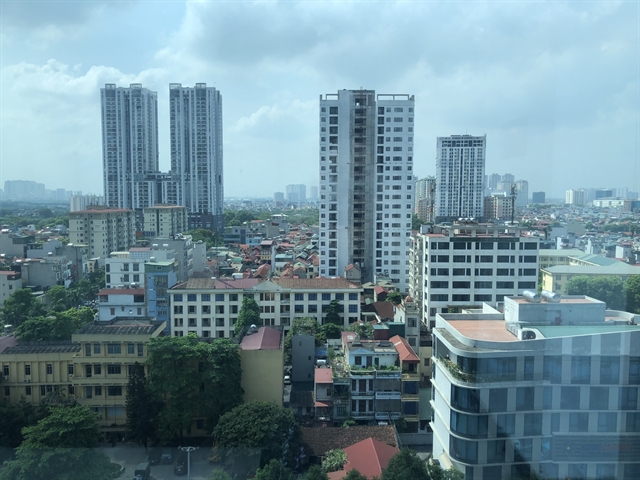 Economy
Economy


|
| Renting a house and spending on another house for rent is the type of investment of millennials in Việt Nam. Condominiums in Hà Đông Districts are among the common choices for such a rent in Hà Nội. — VNS Photo Minh Hương |
HÀ NỘI — Even though he has invested in real estate for more than 10 years and owns houses from the north to the south of Việt Nam, Nguyễn Kiên still lives in a rented house in Hà Nội's Cầu Giấy District.
As renting a house is increasingly common among millennials, more and more rental opportunities have popped up.
Kiên and his wife lived in a villa they own in Linh Đàm area, Hoàng Mai District, southern Hà Nội, three years ago but then rented it out and decided to live in a rented apartment in Cầu Giấy at a cost cheaper than they charge their tenants.
"My wife and I really like to live in a rented place as it is close to the school for our children, and close to where my wife works while I can spend my assets and money to invest," Kiên said.
Nguyễn Việt Dũng, who works for a bank in Hà Nội also leases out his villa in Văn Quán area, Hà Đông District and a house on Láng Hạ Street and lives in rental in Đống Đa District.
Dũng told Việt Nam News: "I feel comfortable when renting a mid-range apartment in the centre of the city, though people keep asking me why when I have houses of my own I still live in a rented apartment, and why would not I buy the apartment.”
David Jackson, general director of Colliers Vietnam, said the previous generation considered housing as a stable value-added asset, now as millennials have become the main workers in society and gotten married, they have their own different housing needs.
Apartments are chosen by most young people today as the prices are considered better in locations more suited to their work and active lifestyle than where townhouses are found. Condominiums are also often closer to important social amenities such as schools, hospitals or shopping malls.
Dũng said renting was convenient, but from an investment point of view, he would never buy an apartment as an accumulative asset but instead spend his money on a separate house or villa.
“The value of an apartment building will go down over time but the prices of separate places will always go up.”
Along the same line of thinking, Nguyễn Bích Liên sold her ninth-floor apartment in Bắc Từ Liêm District for more than VNĐ1.3 billion and put her money into two plots of land in Nam Định and Thừa Thiên-Huế provinces. She rents an apartment in the centre of Mỹ Đình District for VNĐ7 million per month.
"I saw a loss when spending on an apartment building so I put money into residential land in the provinces, hoping the price would increase in the next three to five years. If I had kept the apartment, its price would go down after five years and I would have had to pay more for the travel cost for me and my children, working and studying in Mỹ Đình where my children could access higher-quality schools.”
Born in Hà Nội in 1988, Đoàn Mạnh has lived in a rented house in the capital for the last 10 years, during which he married and had two children. In the past, men like Mạnh would have seen living in the house they owned as essential.
He said: "My principle is that money must be circular instead of being put into a house you live in.
"If you buy an apartment for VNĐ1.5 billion, while the rent of such a house is only VNĐ5 million per month, if you put that VNĐ1.5 billion into a bank savings account, you can get more than VNĐ8 million interest per month or if you invest it in real estate, the profit rate will be more than the rent of VNĐ5 million many times."
Phan Công Chánh, a real estate expert, said leasing out an owned house and living in rented accommodation is not accessible to everyone, especially those who consider houses as fixed assets for them and the next generations. — VNS




